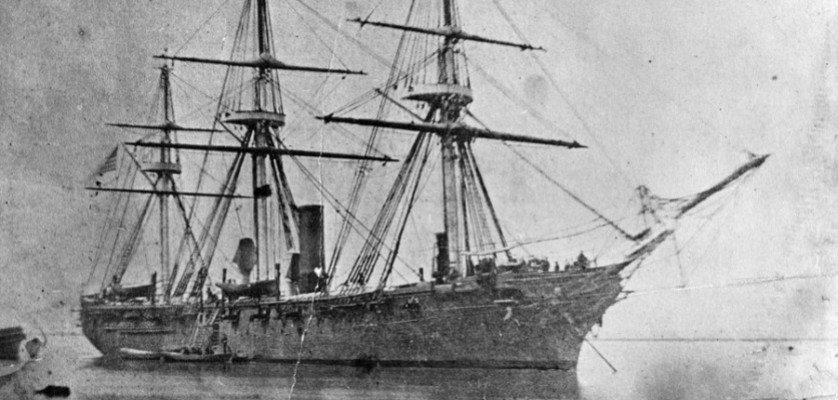During the Civil War, Union naval forces in the South worked to divide the Confederacy by conquering the Mississippi River.
One of the many ships involved in that mission was USS Richmond. During one intense battle, the ship was in danger of exploding, but thanks to four of the ship’s firemen, it survived to see the war’s end.
All four firemen — Navy 2nd Class Fireman John S. Hickman, Navy 1st Class Fireman Matthew McClelland, Navy 1st Class Fireman John Rush and Navy 1st Class Fireman Joseph E. Vantine — received the newly created Medal of Honor for their bravery.
Not a lot of information can be found online detailing the early lives of these men other than where they grew up. Hickman was from Altoona, Penn., McClelland was born in Ireland before his family emigrated to Brooklyn, N.Y., Rush grew up in Washington, D.C., while Vantine was from Philadelphia.
By the time the Civil War broke out, all four men were sailors in the Union Navy stationed aboard the wooden steamship USS Richmond. The Richmond spent the first part of the war in the Caribbean before joining the West Gulf Blockading Squadron, which aimed to divide the Confederacy at the Mississippi River by cutting off its main southern supply and communication route.
By the spring of 1862, New Orleans — the Confederacy’s busiest commercial port — and nearby Baton Rouge had been captured by the Union. The only portion of the Mississippi that remained in Confederate hands was a roughly 150-mile-long stretch of territory between Vicksburg, Miss., and Port Hudson, La.
In December 1862, Navy Adm. David Farragut — who would later be given credit for uttering the famous naval phrase “damn the torpedoes, full speed ahead!” — was in charge of the West Gulf Blockading Squadron. He and other military leaders learned that the Confederates were making improvements to their defenses at Vicksburg and Port Hudson, about 15 miles upriver from Baton Rouge. So, they started making plans to complete their mission sooner rather than later.
Farragut was tasked with getting his flotilla past Port Hudson. On March 14, 1863, Farragut ordered seven ships, including USS Richmond, to make their move. Farragut was expecting a coordinated attack by the Union Army to divert enemy fire that would damage the ships, but that inland support arrived too late. The ships ended up facing the full force of Confederate artillery shelling.
The Richmond was the second ship in line in the flotilla. Between the enemy fire and the river’s strong current, it struggled to continue its journey upstream. Before it could round a curve in the river to get past the fort, Richmond was hit by a 6-inch shell that shattered the starboard safety-valve chamber and damaged the port safety-valve chamber. This ruptured the ship’s steam lines, which caused the engine room to immediately fill with steam. If something wasn’t done quickly, the ship would explode.
As firemen, Hickman, McClelland, Rush and Vantine knew what to do and immediately jumped to it. Without concern for themselves, each man wrapped wet cloth around their faces and ran into the steam-filled room to put out the furnaces. The men relieved each other when they were overcome by heat and kept this up until the threat of explosion dissipated. Their actions saved the ship, which had to turn back and abort the mission to continue past Port Hudson.
While that battle wasn’t very successful — only two of the seven ships in the convoy succeeded in getting past Port Hudson — the bigger mission eventually triumphed. Four months later, the Union Army and its naval ships, including the Richmond, captured Port Hudson. A few days prior, a nearly two-month siege of Vicksburg to the north also ended in a Union victory, finally bringing the entire Mississippi River under Union control.
For their bravery under fire, Hickman, McClelland, Rush and Vantine were awarded the newly created Medal of Honor on July 10, 1863.
All four men survived the rest of the war. Hickman went back to his hometown and lived there until he died on Dec. 24, 1904. Vantine returned to Philadelphia and got an education. He eventually married, settled in Newcastle, Del., and became an engineer at an iron works company.
No details on McClelland’s post-war life were available, but he died in Philadelphia on Jan. 30, 1883. Rush returned to D.C., eventually changed his name to Israel Little and got married. Of the four men, he lived the longest — to age 79 — and died on April 29, 1916.
Editor’s note: Medal of Honor Monday highlights Medal of Honor recipients who have earned the U.S. military’s highest medal for valor.












